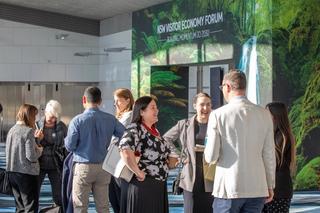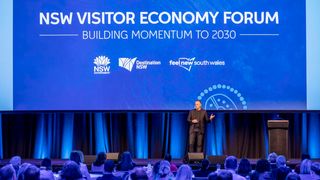NSW visitor economy stakeholders shared in data, insights and ideas from thought leaders, industry experts and colleagues at the NSW Visitor Economy Forum - Building Momentum to 2030 hosted by Destination NSW yesterday.
The forum, the second of its kind, explored opportunities for those engaged in the visitor economy to turbocharge growth as the state transitions from the 'recovery' to the 'momentum' phase of the NSW Visitor Economy Strategy 2030.
The momentum phase has a target of $50 billion in visitor expenditure by 2026 as the state progresses towards the bold target of generating $65 billion in visitor expenditure by 2030.
The forum provided hundreds of attendees with a deep dive into market and social trends, updates on Artificial Intelligence, data and technology, and international travel projections via a series of keynote speeches and panel discussions.
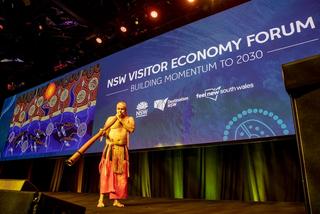
Working together to build momentum
The NSW Visitor Economy Forum – Building Momentum to 2030 commenced with a Welcome to Country by Uncle Allen Madden and Nathan Leslie, followed by a welcome message via video from Minister for Jobs and Tourism John Graham and an opening address by Destination NSW CEO Steve Cox.
“With international visitation increasing steadily from all NSW’s priority markets and the appetite for domestic travel still strong, we are well positioned to continue the strong recovery and transition into a growth period for our state’s visitor economy,” Minister Graham said.
Destination NSW CEO Steve Cox said: “Our cumulative visitor numbers and visitor expenditure across international, domestic and day trip traveller segments are positive and continue to grow compared to pre-pandemic levels.
"In the year ended June 2023, NSW welcomed 105.4 million visitors, compared to 67 million in year ended June 2020, who generated $48.6 billion in visitor expenditure, compared to $24.8 billion in year ended June 2020.
"Major visitor economy infrastructure projects in the pipeline, such as Western Sydney International Airport, will give stakeholders at home and overseas added confidence to explore new opportunities and open up new destinations in NSW."
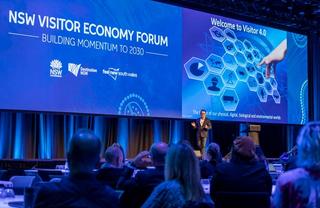
How technology is enhancing the visitor experience
NSW Visitor Economy Forum – Building Momentum to 2030 attendees heard from keynote speakers including futurologist Professor Rocky Scopelliti, McCrindle Director of Advisory Ashley Fell, Google Head of Data, Analytics and Artificial Intelligence Max Kaye and Tourism Australia Manager – Strategy and Research Rob Harding-Smith.
The speakers gave expert insights on the key data and trends that will ensure NSW becomes the premier visitor economy of the Asia Pacific by 2030.
Professor Scopelliti encouraged stakeholders to embrace the emergence of digital experiences that involve all five senses, heighten trust in the data they share online, be sustainability focused and understand how the boundaries between business and leisure travel are blurring.
"If regions prioritise offering a seamless experience for working travellers, it will make NSW a very desirable destination," he said.
Rather than being scared of new technology, Professor Scopelliti said visitor economy businesses should be excited about the possibilities that lie ahead.
He gave the example of nature-based stakeholders using virtual reality to augment their offering, such as providing visitors with the opportunity to walk with dinosaurs in a national park.
Google's Kaye said operators should explore ways to entice potential visitors via social media.
"Social media platforms and advances in technology offer an amazing opportunity to draw people into a visitor experience, give them a taste of it, then move them from the virtual to the physical," Kaye said.
McCrindle's Fell said social media was quickly becoming the primary source of information for holiday planning.
"The number one search engine for younger generations is YouTube because why would they read something when they can watch it?" she said.
"Many of them are planning their entire trips based on content they have seen on social media platforms."
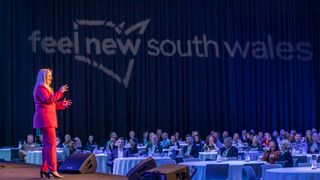
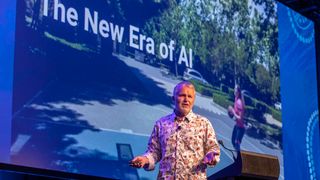
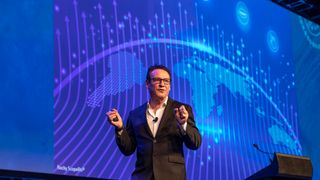
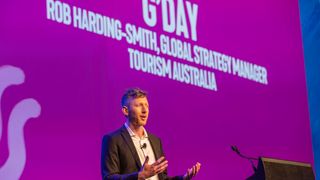
The artificial intelligence opportunity
A poll at the NSW Visitor Economy Forum – Building Momentum to 2030 found 69 per cent of attendees agreed Artificial Intelligence (AI) was changing the way the world does business.
Kaye and Fell highlighted the role AI can play in addressing staffing issues.
They said Australian Bureau of Statistics data showed the food and accommodation sectors are experiencing some of the highest staff shortages in Australia.
Kaye offered practical examples of how AI can help businesses, such as undertaking time-consuming, repetitive tasks and research, giving staff more time to focus on customer-facing tasks.
He said that AI would make it easier to communicate with customers and noted, for example, that six million Australians speak a language other than English at home, as do many inbound visitors.
"AI brings the ability to translate information about your visitor experiences in multiple languages in real time, easily and accurately," Kaye said. "Using it can help you reach a much broader constituency."
Fell said it was important for visitor economy stakeholders to refocus their businesses and organisations following the pandemic and not simply resume doing things the way they had always done them.
"Reimagine the new rather than just rebuild the old," she said. "The strength of an industry comes from its stories and traditions, but the future of an industry rests in its relevance and innovation."
Seeking 'affinity experience' opportunities
'Affinity experiences' is the latest buzzword in visitor economy growth according to Tourism Australia Manager – Strategy and Research Rob Harding-Smith.
Harding-Smith shared insights from Tourism Australia's The Future of Global Demand research report, discussing the importance of understanding the secondary experiences visitors are seeking in addition to their primary reason for travel.
Mountain and rock sports fans for example have an affinity with trekking and camping; beach lovers also seek water-based activities such as whale and dolphin watching; wildlife lovers enjoy festivals; people who like visiting notable buildings are highly interested in learning more about indigenous history; while trail running travellers love bird watching.
"If you have a trail running business and you know someone with a bird-watching business, team up with them to explore growth opportunities together," he said.
"Are there growth opportunities for you in new markets? Are you cross-promoting the right activities and experiences? Are there any multi-business collaborations you can explore to drive better financial outcomes?"
Harding-Smith also highlighted the value of major events in the 'affinity experience' space.
"People who travel to NSW for major events are likely to also be interested in activities such as kayaking, rafting, war history, extreme sports and bar hopping," he said.

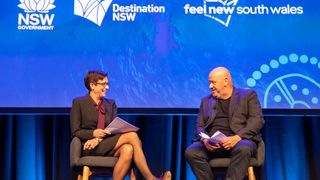
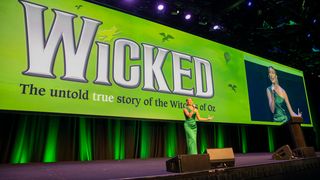
The value of major events to NSW
Destination NSW General Manager - Events Julie Turpie discussed how the major events calendar in NSW had gone from strength to strength over the last 12 months.
More than 80 events were secured retained or acquired by Destination NSW during the period, attracting millions of attendees and generating an estimated $900 million in visitor expenditure. They included the UCI Road World Championships in Wollongong, Sydney WorldPride, Vivid Sydney and the FIFA Women's World Cup.
Musicals were also highlighted a major source of visitor economy growth. Turpie said four musicals currently on stage in Sydney - WICKED, Beauty and the Beast, TINA - The Tina Turner Musical and Miss Saigon - had collectively attracted an estimated 150,000 visitors and $90 million in visitor expenditure to the state.
WICKED cast member Zoe Coppinger performed a song for NSW Visitor Economy Forum attendees, while The Culture Farm Director Jane Ross - who is delivering the campaign for the musical – said the impact of major musicals on Sydney was significant.
"WICKED employs approximately 300 people," she said. "More than 35 per cent of total visitation is from outside of Sydney, with attendees staying in Sydney hotels, eating in restaurants and visiting local attractions."
Turpie also interviewed SXSW Sydney Managing Director Colin Daniels, who said the festival would "celebrate Sydney and NSW's beauty, but also show off its brains" when it opens on 15 October 2023.
"SXSW Sydney will become an indispensable event when it comes to doing business in the creative industries in the Asia Pacific," Daniels said.
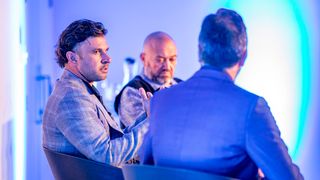
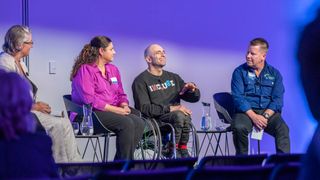
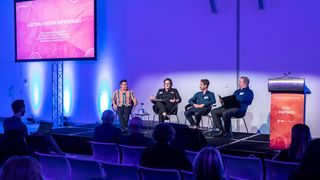
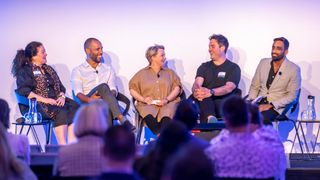
Panel sessions dive into showcasing the state's strengths
Twelve break-out panel sessions were held during the NSW Visitor Economy Forum, with a detailed focus on the state’s strengths which will provide opportunities for future growth.
Topics ranged from the commercial and social benefits of accessible and inclusive travel, how Aboriginal tourism is evolving, embedding sustainability and telling the story, embracing the wellness travel opportunity, the power of public relations and earned media, agritourism, connecting with visitors through culinary experiences, creative industries and the 24-hour economy, and the factors that make a destination competitive in the business event market.
Some of the insightful tips shared by industry panellists include:
- LGBTQIA+ travel is a large segment and it’s growing. The LGBTQIA+ travels more and is very loyal to inclusive experiences
- Consume the media that you’re trying to be in and pitch to. If you want to use a certain medium, you need to engage in it
- Business event attendees can be converted to repeat visitation as leisure travellers or extend beyond the event
- The most important thing is to make experiences bookable: a set price that can be booked online and paid ahead
- Visitors want to know that they’re supporting the community and helping locals in some capacity
- Create experiences that are sensory and Instagram worthy.
Destination NSW will include more highlights from these focus sessions in next week’s edition of Insights.
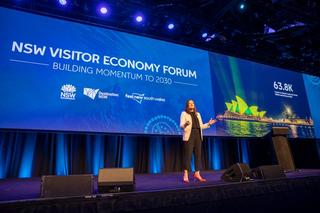
Feel new brand resonates with travellers
General Manager Consumer Marketing Kathryn Illy discussed how the Feel New brand was shifting from a destination brand to a culture brand.
"Culture brands go beyond just selling a product, destination or a service," she said. "They stand for more. Our job as an industry is to not just talk about what we do, but how an experience makes people feel."
She also revealed the success of the Feel New campaign, which has generated $230 million in incremental spend for the NSW visitor economy since it launched in 2021.
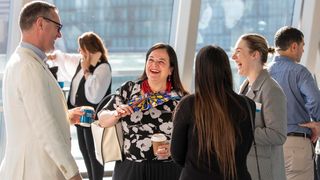
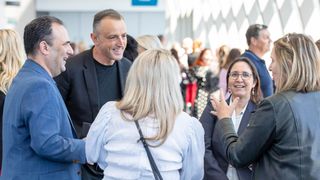
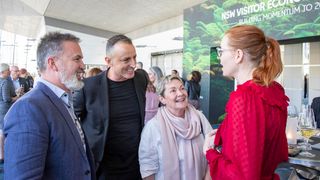
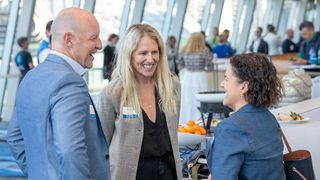
Thank you for joining us at the NSW Visitor Economy Forum
Thank you to everyone who attended the NSW Visitor Economy Forum – Building Momentum to 2030.
We hope the expert insights on the data and trends shaping the NSW visitor economy provided an opportunity for you to focus on the future and how we can work together to accelerate our shared goal of making NSW the premier visitor economy of the Asia Pacific by 2030.
